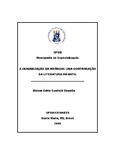| dc.contributor.advisor | Munhóz, Maria Alcione | |
| dc.creator | Donatto, Miriam Edite Canfield | |
| dc.date.accessioned | 2016-05-02T15:34:52Z | |
| dc.date.available | 2016-05-02T15:34:52Z | |
| dc.date.issued | 2005-03 | |
| dc.date.submitted | 2005 | |
| dc.identifier.uri | http://repositorio.ufsm.br/handle/1/1569 | |
| dc.description | Monografia (especialização) - Universidade Federal de Santa Maria, Centro de Educação, Curso de Especialização em Educação, RS, 2005. | por |
| dc.description.abstract | This work is a bibliographical research that has as indicative theme the
humanization of the childhood through the infantile literature, where works in
the fields of the History, Literature, Psychology and Psychopedagogy were
studied. He/she makes a parallel one between the humanity's childhood and
the one of the man in relation to its humanization and that contributions the
literature can give in that process. It defines what is culture, art and literature
and which the paper that they possess in the humanity's evolution and of the
man. It approaches aspects that show the as the infantile literature went and
it will continue to be essential for the human being integral development, still
in the childhood. Literature, that, that uses the resource of the wonderful as
form of facilitating the child the discovery and the understanding of the world
that the fence, what can be decisive in its integral formation. Literature that, of
strategic form, it shows that the good and the badly, the right and the wrong
trace a parallel one between the real world and the fictitious, approaching
subjects concerning the injustice, of the relationships of power, of the
exclusion, among other, in an attempt of rescuing the disposition for the
practice of the good through the emotional growth. This work also exposes
the contribution that the classic of the Infantile Literature provide to the child,
in the search for its own humanization, that is indispensable value for the
acceptance and respect to the difference. Desires and fears are fundamental
for the preservation and the men's evolution, and the classic literature
approaches those front themes, but implicit way, giving courage to the child
to try to solve real situations without losing that that is indispensable to whole
human being and that nobody can be entitled the of taking it, mainly of the
childhood: the hope that in the end everything will give right. | eng |
| dc.language | por | por |
| dc.publisher | Universidade Federal de Santa Maria | por |
| dc.rights | Acesso Aberto | por |
| dc.subject | Educação | por |
| dc.subject | Psicopedagogia | por |
| dc.subject | Literatura infantil | por |
| dc.subject | Infância | por |
| dc.subject | Humanização | por |
| dc.title | A humanização da infância: uma contribuição da literatura infantil | por |
| dc.title.alternative | The humanization of the childhood: a contribution of the infantile literature | eng |
| dc.type | Trabalho de Conclusão de Curso de Especialização | por |
| dc.degree.local | Santa Maria, RS, Brasil. | por |
| dc.degree.specialization | Educação | por |
| dc.description.resumo | Este trabalho é uma pesquisa bibliográfica que tem como tema
norteador a humanização da infância através da literatura infantil, onde obras
nos campos da História, Literatura, Psicologia e Psicopedagogia foram
estudadas. Faz um paralelo entre a infância da humanidade e a do homem
em relação a sua humanização e que contribuições a literatura pode dar
nesse processo.Define o que é cultura, arte e literatura e qual o papel que
elas possuem na evolução da humanidade e do homem. Aborda aspectos
que mostram o quanto a literatura infantil foi e continuará a ser essencial
para o desenvolvimento integral do ser humano, ainda na infância. Literatura,
essa, que usa o recurso do maravilhoso como forma de possibilitar à criança
a descoberta e a compreensão do mundo que a cerca, o que pode ser
decisivo na sua formação integral. Literatura que, de forma maniqueísta,
mostra que o bem e o mal, o certo e o errado traçam um paralelo entre o
mundo real e o fictício, abordando questões acerca da injustiça, das relações
de poder, da exclusão, entre outros, numa tentativa de resgatar a disposição
para a prática do bem através do amadurecimento emocional. Este trabalho
também expõe a contribuição que os clássicos da Literatura Infantil
proporcionam à criança, na busca pela sua própria humanização, que é valor
imprescindível para a aceitação e respeito à diferença. Desejos e medos são
fundamentais para a preservação e evolução dos homens, e a literatura
clássica aborda esses temas de frente, mas de maneira implícita,encorajando a criança a tentar resolver situações reais sem perder aquilo
que é indispensável a todo ser humano e que ninguém pode ter o direito de
tomá-la, principalmente da infância: a esperança de que no final tudo dará
certo. | por |
| dc.publisher.unidade | Centro de Educação | por |


